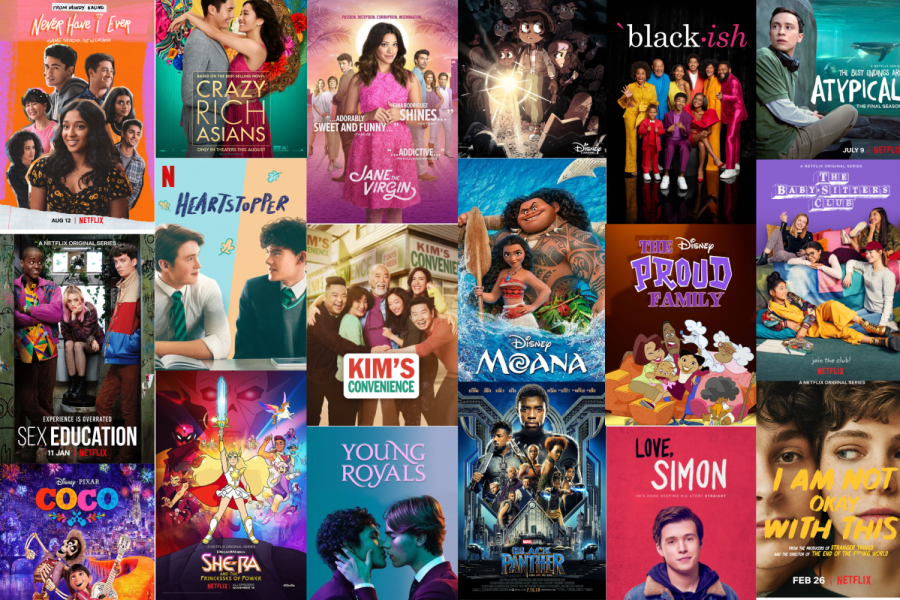Representation Matters
A collage of shows praised for their representation.
Media– we’ve all consumed it in some form. Whether that’s books, TV shows, movies, the news, it’s inescapable. Media fills our lives and influences our decisions. Although much of this media may be fiction, it affects our reality more than might meet the eye.
Alongside media, something else is also ever-present in our society: discrimination. Discrimination that is based solely on the fact that people are different from each other. People are often discriminated against because of misconceptions based on stereotypes. In recent years, the exponential growth of social media and technology has made it faster and easier to spread information– for better or for worse. Stereotypes are spread through the media as well. When adding “diversity”, many movies, TV shows, and books end up adding stereotyped characters which actually do more harm than good because they reinforce false notions.
But what would happen if this representation was realistic?
A common analogy used when referring to media is how it can be a window and a mirror. Although some media may just be a window to me (and others), for plenty of other people, it can be a mirror of their own lives. These pieces of “mirror” media can greatly impact people.
Representation in media matters because it can increase self-esteem, break down stereotypes, and improve empathy.
Increasing one’s self-esteem is one of the great things representation can do. In an article for PBS, one teen stated, “If you see people who look like you and act like you and speak like you and come from the same place you come from … it serves as an inspiration.”
When youth, and even adults, view media that includes characters that share part of their identity, it helps reinforce that they matter and are important. However, if they’re not represented, it can have a very negative effect.
Tia Pruss, a State High junior, has felt these negative effects firsthand. “That was very saddening to me, to not see any person who looked like me or identified like I did. It made me feel more isolated in my identity.”
Our society is so focused on the “normal” identity of Caucasian, able-bodied, cisgender, and heterosexual that we fail to realize that nearly everything we consume features that ideal person.
We are so used to this that we don’t even give it a second thought.
For young marginalized people, this social norm creates a feeling of the need to hide any differences. Fearful of being criticized or frowned upon, youth hide pieces of their identity to fit in. Suppressing these traits leads to low self-esteem and feelings of worthlessness.
“It’s difficult to not understand that it feels like everyone else is somewhere, and you’re not in a sense. The feeling that you’re not represented is a struggle, for sure. Just because it almost feels as if you’re swept under the rug. And that’s never good for anyone really.” Pruss says.
In a study at the University of Michigan, researchers discovered that while young white boys’ self-esteem was improved when watching popular media, young girls and people of color had a lowered sense of self-esteem. One of the study’s authors, Nicole Martins, explained the concept of symbolic annihilation as “The idea that if you don’t see people like you in the media you consume, you must somehow be unimportant.”
State High students have been– and are still being– personally affected by this. Cyril Haque, a South Asian freshman student, shared his experience with this: “It made me feel really alienated if I didn’t fit those stereotypes, like I felt that I wasn’t really Southern Asian. So it made me sort of envy those who were represented in the media, such as white people.”
Media lacking representation contributes to symbolic annihilation. When youth grow up with low self-esteem, they become more susceptible to depression and even suicidal ideation. Something as simple as adding representation can change this.
Representation also has positive effects on people viewing the media through a window instead of a mirror. As previously mentioned, much of the existing “representation” is based on stereotypes, which leads to discrimination. By accurately representing diverse identities, people watching learn more about other cultures. One of the best ways to prevent discrimination is by educating people about those different from themselves. Instead of enforcing false notions, representation opens up minds to the fact that everyone can experience their identities in different ways: whether that’s gender, race, disability, sexuality, or plenty of others.
A final reason that representation matters is the fact that it increases empathy. Adding diversity in media affirms many people’s identities. It not only helps the people who relate but also the people who don’t. Seeing diversity in the media promotes acceptance for everyone.
“I think [representation] definitely helps me realize that there’s more than one type of person in the world. There’s really no cookie-cutter shape for what a character has to or can look like, or speak like, or act like. Especially when those characters who differ from social norms aren’t villainized because I think that’s really important,” Haque said.
By showing things that others struggle with, we learn how we can support them. Empathy is a vital part of making the world better. If everyone could take some time to understand each other, conflict could be avoided.
Increasing self-esteem, breaking stereotypes, and improving empathy are some of the main reasons that representation is so important. Media has made substantial improvements in the past few years. “More recently I see characters that are Muslim and Brown– such as myself– and they’re just unapologetically that way. There’s no big fuss made about it, it’s just like they’re there to exist. And I think that’s really all that you need,” Haque stated.
Although there is progress being made, there’s still so much room for needed improvement. To change our society, we must change what we consume. The world has everyone in it, so it’s crucial that we see everyone.
Your donation will support the student journalists of State College Area High School. Your contribution will allow us to purchase equipment and cover our annual website hosting costs.

Lacey Sheaffer is a junior in her third year of journalism. She is the News editor this year. She enjoys running distance with the girls' cross-country...







Cyril • Nov 15, 2022 at 3:32 PM
That’s so real Lacey this article is extremely based